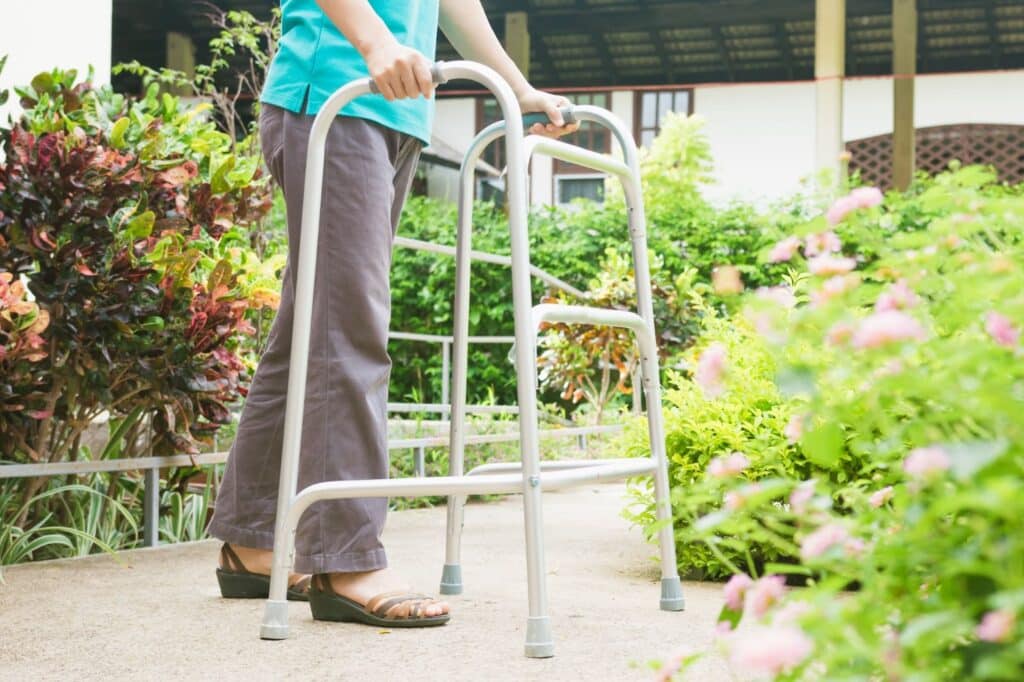Becoming a caregiver for an elderly parent is a profound act of love and responsibility and can be rewarding and challenging. When a parent’s health begins to decline, they may find themselves unable to walk, with significant impacts on their daily living routine.
You can support your parent through this transition by providing physical and emotional support, improving accessibility through home modifications, providing assistive devices, and seeking extra support, such as assisted living, when necessary.
Immobility in Elderly Parents
The loss of mobility can feel like the loss of independence. For an elderly parent who can’t walk, routine tasks can become obstacles, social interactions can decline, and the fear of being a burden to adult children and family members can take an emotional toll.
For many adult children, witnessing their once self-reliant parent struggle can be a painful experience. Understanding these challenges is the first step in a caregiving journey. Mobility is more than the ability to move independently; it can also represent freedom and often defines a person’s sense of self.
Physical & Emotional Support Strategies
When an elderly parent’s mobility is affected, it’s essential to tailor a support system that can cater to their needs. Help with activities of daily living (ADLs) like dressing, bathing, and eating can address the more immediate needs, but that’s not all.
Emotional well-being is just as crucial, if not more so. Spending quality time with your parent, engaging in their interests, and listening to their concerns can help to offer comfort and combat the feelings of loneliness and depression that often accompany immobility.
Home Modifications for Improved Accessibility
To maintain an elderly parent’s independence, consider home modifications that make life easier for them. Examples of home modifications or home improvements that contribute to a safer and more accessible home environment can include the following:
- Installing grab bars near the toilet and in the shower
- Rearranging furniture for wider and more direct pathways
- Adjusting the height of countertops and shelves for easy reach
Engage with professionals who specialize in home accessibility and consult with occupational therapists who can offer valuable suggestions. Prioritize the rooms and areas of the home your parent uses most frequently, and approach each modification as a step toward promoting their autonomy.
Assistive Devices

Various assistive devices are available that not only support daily living but also empower your parent to engage with the world on their terms. From mobility aids like canes and walkers to more specialized equipment such as stair lifts and motorized scooters, these tools can dramatically expand the range of activities and experiences your parent can still enjoy.
It’s important to view using assistive devices as a positive step. Rather than focusing on what your parent can’t do, these tools help highlight what they can still achieve with the right support.
The Role of the Caregiver
If you find yourself a caregiver to a parent who can’t walk, it’s crucial to recognize that this role can be both demanding and rewarding. Caregivers must balance their health and well-being with the needs of their loved ones, which often involves seeking support from others, managing stress, and setting boundaries.
Adult children can utilize all available resources, including respite care services that provide a break for the caregiver, support groups that offer solidarity and guidance, and educational programs that can improve caregiving skills. Remember, it’s okay to prioritize your physical and mental health and ask for help.
Professional Support
When mobility issues become severe, professional care can provide personalized care, comfort, and safety for an elderly parent with mobility issues. Transitioning a loved one to a community can be a challenging decision for many families, as it often entails leaving their family home.
When considering professional care, be sure to involve your elderly parent in the decision-making process as much as possible. Research senior communities, visit different communities, and discuss the arrangements openly with your family. Looking into different types of lifestyles can provide options that align with your elderly parent’s specific needs and desires.
Assisted Living
Assisted living can support an elderly parent with daily living while respecting their independence. Services in assisted living can include:
- Medication management
- Help with bathing, dressing, grooming
- Assistance with walking
- Access to trained staff 24/7
- Housekeeping and maintenance
- Transportation
- Prepared meals
Assisted Living for Personalized Support
Caring for an elderly parent who can’t walk requires practical skills, emotional fortitude, and a willingness to tap into a broader support network. By focusing on mobility solutions that maintain independence, provide emotional support, and connect with available resources, you can help your elderly parent adjust to this new phase of life.
However, you can seek support from professional care that meets your parent’s needs while honoring their autonomy. Contact The Legacy at Cimarron to learn more about assisted living.
